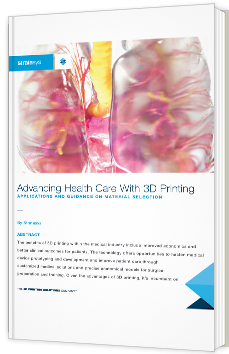

Améliorer les soins de santé avec l'impression 3D.

"The benefits of 3D printing within the medical industry include improved economics and better clinical outcomes for patients. The technology offers opportunities to hasten medical device prototyping and development and improve patient care through customized medical solutions and precise anatomical models for surgical preparation and training. Given the advantages of 3D printing, it’s incumbent on the medical community to consider how this technology can improve the process, products and services it provides. However, each application poses different demands for materials that may include biocompatibility and sterilization. This white paper illustrates 3D printing applications in the medical industry using Stratasys® FDM® and PolyJet™ technology and provides specifications for appropriate material selection.
INTRODUCTION TO 3D PRINTING
3D printing, also known as additive manufacturing, is the creation of 3D objects from a digital model. A 3D printer uses software that “slices” the model into thin layers and uses that information to deposit material, layer by layer, where it’s needed to create the object. Because it’s an additive process, material use is minimized and complex shapes that would be difficult or impossible to make with conventional manufacturing methods are easily achievable."